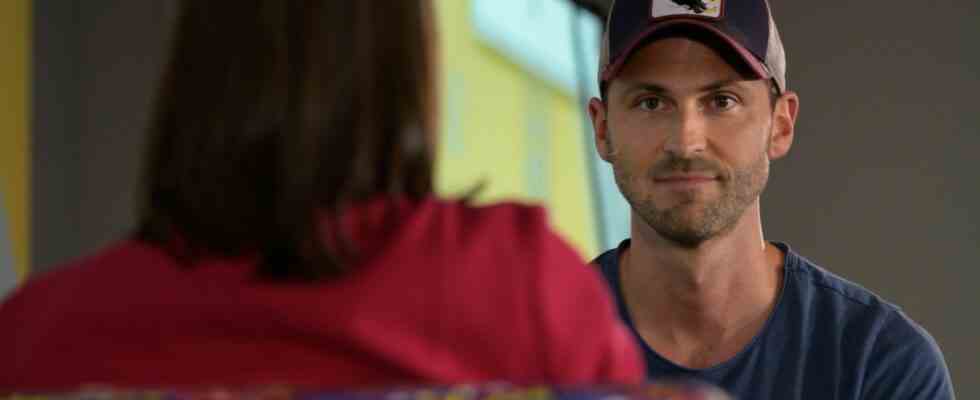Reduce plastic when cleaning
Plastic can be avoided more and more in the fridge and pantry, but if you open the cleaning cupboard at home, you will find a lot of it: bathroom cleaner, washing-up liquid, toilet cleaner, glass cleaner – all in large plastic bottles. The content is mainly water. “But what’s the point of driving all that water in plastic bottles across Germany when everyone has tap water at home?” asked David Löwe at the SZ sustainability summit. Because nobody could give him an answer to this question back then, he founded “Everdrop” three years ago together with two other Munich residents. The start-up sells cleaning products in the form of effervescent tablets. At home, users can dissolve the tabs in water and deposit them in reusable glass bottles.
In David Löwe’s company, toilet cleaner is pressed into powder tabs.
(Photo: Alessandra Schellnegger/SZ)
The desire to avoid plastic already existed in the 1990s. Nevertheless, according to the Federal Environment Agency, the amount of packaging waste has increased almost continuously over the past twenty years to almost 20 million tons a year. The idea of pressing cleaning agents in tabs instead of in large plastic bottles is not new at all. The young founder admits that such tabs have existed for a long time. “But apart from the colorful bottles on the supermarket shelves, nobody was interested in it.” But in the meantime, buying behavior is changing in his favor and more and more investors have joined Everdrop. By June, the brand for sustainable cleaning agents and personal care products had raised 18 million in capital.
The eternal stuff
What used to be passed down through generations has now become a disposable product: clothing. The start-up “Pyua”, pronounced “pure”, wants to change that and manufactures jackets, sweaters and pants from recycled plastics and merino wool. When it comes to outdoor clothing, the founders are not only concerned with not consuming new resources. You also want to make products that last as long as possible. If the clothing is eventually thrown away, it should be completely recyclable. If there is actually no more waste, this is called the circular economy. “We want to be a role model, so that it’s possible, and we’re happy to pass on our know-how,” says Arianna Fritz, who is responsible for design at Pyua.
Arianna Fritz takes care of the design at the outdoor label Pyua, she wants to reduce the ecological footprint of the products to a minimum.
(Photo: Alessandra Schellnegger/SZ)
But it’s not easy, especially with functional clothing. Because the material of rain jackets has to meet many needs at the same time. It has to be rainproof, breathable and naturally warm. In order to avoid microplastics, it should not contain fleece, which has long been common in multi-layered warmer jackets, says the design specialist. Pyua therefore relies on so-called “mono-plastics” for the individual material layers. After the end of its useful life as a jacket, the individual materials can be recycled into a sleeping bag, for example. But the start-up is not only concerned with more sustainable materials, but also with reduction. Do you need three different jackets for cycling, hiking and skiing? Or maybe a model that can be adjusted with layers and zippers is enough, asks Arianna Fritz, who designs such jackets at Pyua.
Off to the rooftops
Anyone who has solar panels on their own roof is usually proud of their own energy, but if you ask the solar panel owners about the history, racked nerves often come to light. The German bureaucracy and the different requirements of the network operators have made it difficult for private individuals to produce their own electricity. The idea of ”Enpal” is to make solar energy more accessible. The company installs solar panels for rent in order to save customers the expensive purchase decision. “A solar system is often the most expensive purchase in a household after a house and car,” says climate activist and multiple author Wolfgang Gründinger, who sits on the podium at the SZ Sustainability Summit wearing a colorful cap. He joined Enpal in 2019 as “a kind of foreign minister”.
Solar law experts, installers and consultants work there. The service includes all applications from the authorities, insurance, installation and the contract with the respective network operator, says Gründinger. With his job at Enpal, he wants to help transform the positive attitude towards solar energy into political action and private decisions. “Many people are really keen to be able to produce clean energy at home themselves,” says Gründinger. But it is made unnecessarily difficult for them with notary visits, land register entries and umpteen forms.
Since Putin’s war in Ukraine, however, it has been clear that Germany urgently needs to become independent of Russian gas. The climate activist is certain that ecologically clean would only be possible with renewable energies. With the multiple installation of solar panels across Germany, Enpal also wants to prove that things can be done faster. CO₂ emissions in Germany must be reduced from four gigatons per year to zero. “If we solve the bottlenecks now, then we can do it,” says Gründinger.

